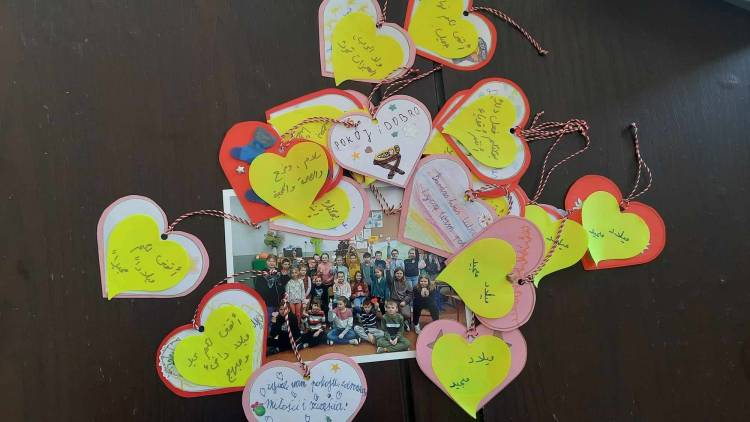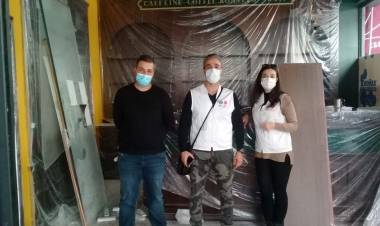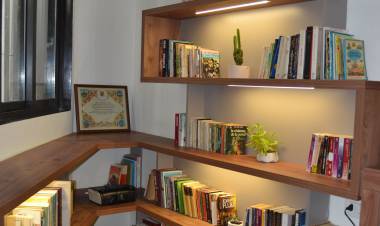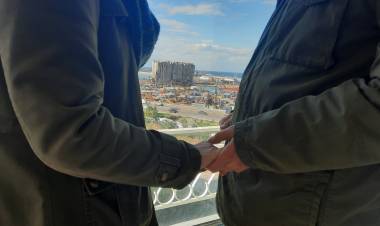Hearts from Poland in the South Lebanon
Once again we are going to Nabatiyeh to the Catholic school of the Antonine Sisters. We are bringing with us funds to cover additional scholarships for children from the nearby village of Kfour. We are also carrying a priceless treasure: papper hearts from Polish children, on which they wrote wishes for the kids from Kfour:
"You can do it!"
"I believe in you!"
"The sun always shines after the storm"
"I wish you peace"
"Happy Christmas"
We meet sister Marie, who tells us how life in the city looks like. “Sometimes we hear a huge bang coming from the distance. The mountains magnify the sounds of the bombings.” The Catholic school accepted children from Muslim families who had fled to Nabatiyeh from destroyed border villages. She talks about one of them, and after 3 days we see on the Internet more images of attacks on this village and more destroyed houses. Unofficial statistics indicate that over 500 houses in the South have already been destroyed (3,000 damaged), and 80,000 thousand people have left their villages and fled to other areas of Lebanon. More than 200 people were also killed, 30 of them civilians. The Lebanese-Israeli border is affected by war. Silent war.
Father Youseff joins us. They are both touched when they look at the hearts and greeting cards. We are also discussing help for families from Kfour as part of the "Warmth for" project. After a while, father Youseff leaves to supervise the children taking their exams. After he leaves sister Marie thanks for our willingness to support them. She talks about a man he sees on the street collecting wood or anything he could use to heat his house.
After three days, we are finalizing the details of help for 9 families: diesel, gas, wood. On the same day, we also learn that a rocket hit a moving car in the center of Nabatiyeh. For now, it is not known who was in the car. However, "our" school is nearby.
We are working in parallel in the second village, Homsiyeh. This one is located closer to Sidon, in the Jezzine region. It can also be „noisy” there, and the memories of the previous war are still like a fresh wound. Nelly's dad helps us to specify the needs. He also talks about the destruction during the war in 2006. Some houses have still not been rebuilt. There is a fear and uncertainty in the air. “My window lockers fell out as a result of the shock wave during one of the recent attacks on the surrounding hills. People have learned that when you hear drones, there will be rockets soon."
In addition, the economic situation is tragic. They say that trade has stopped and aid is not arriving. It's arriving. From us. We have previously installed solar lamps in Homsiyeh and Kfour as part of "Light for". To understand how much this project means, just quote Nelly's words: "When we went to Homsiyeh to celebrate Christmas, we had no light except this lamp.” “Your lamp saved our Christmas”, she adds.
Now, as in Kfour, we have focused on heating- 12 families received diesel and wood, 8 received heaters. We also paid for diesel for the church. When residents meet for mass, inside there is only a few degrees. And the church is everything to them. They told us about it. This is a symbol of their existence in Galilee. That's why they are so afraid of bombings. They are afraid that if the church is destroyed, they will disappear too. Nobody will give them money to rebuild. This is what father Goerge, who comes from Kfour, said. He also said that his village was bombed 44 times in 2006. A village where about 100 Christian families live and probably a few more Muslim ones.
These hearts, lamps, diesel, heaters or our presence, will not change the South. They will not silence the noise, they will not dispel the fog of uncertainty, they will not calm down the coming tomorrow. But they will hold their hands. And for those who try to help, they will perhaps be a signpost, clearly indicating that everyone must contribute to the Light and Warmth reigning in the South of Lebanon/Lebanon/Middle and Far East/World. Like a bricks of peace. And it is important that the bricks stick together to form one durable wall.











Comments (0)
Facebook Comments (0)